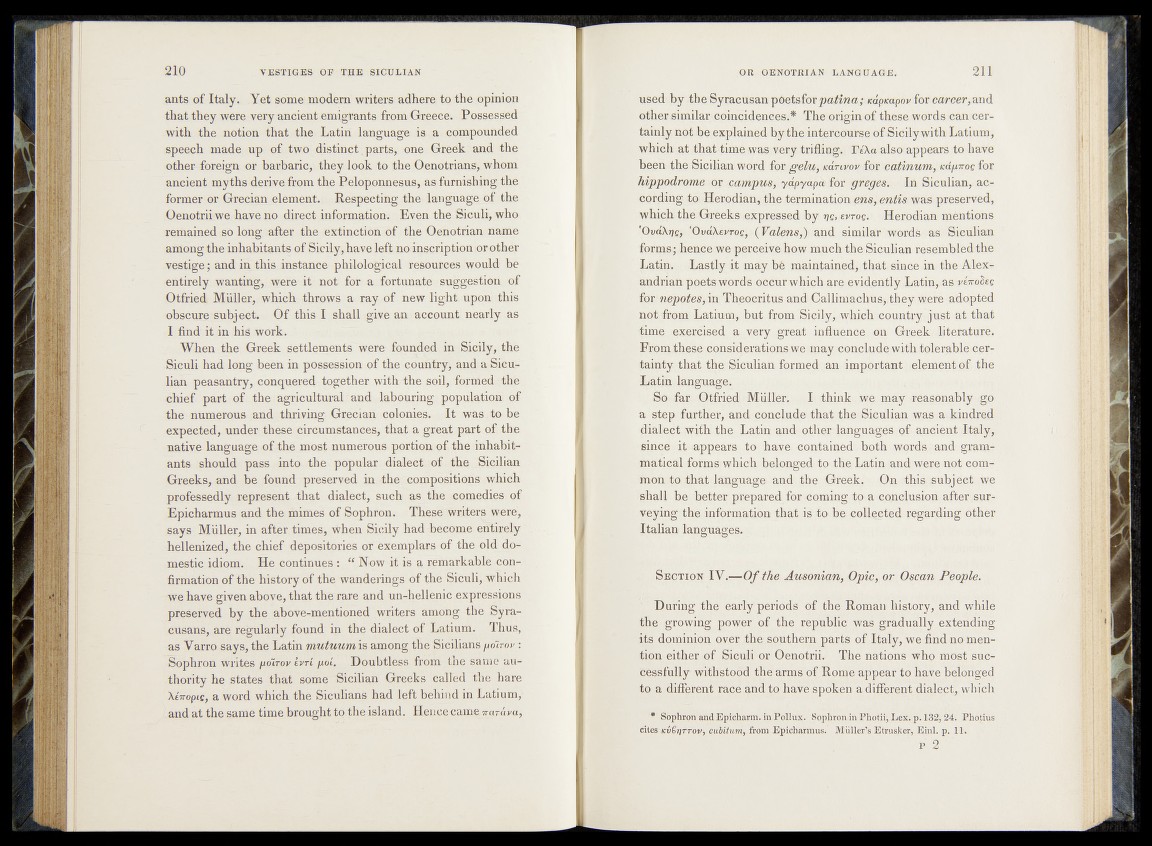
ants of Italy. Yet some modem writers adhere; to the opinion
that they were very ancient emigrants from Greece. Possessed
with the notion that the Latin language is a compounded
speech made up of two distinct . parts,, one Greek and the
other-foreign or barbaric, they look to the Oenotrians, whom
ancient myths derive from the Peloponnesus, as furnishing the
former or Grecian element.; Respecting the language of the
Oenotrii we have no direct information. Even the Siouli, who
remained so long after the extinction of the Oenotrian name
among the inhabitants of Sicily, have left no inscription or other
vestige; and in this instance philological resources would be
entirely wanting, were it not for a fortunate suggestion of
Otfrieds Muller, which throws a ray of new light upon-,this
obscure *subjeefr. Of this I shall give an account needy .as
I find it in his work.
When the Greek settlements" were" founded. in>Sicily,the
Siculi had long been in possession of the country, and a Sicu.-
lian peasantry, conquered- to g e th ^ withfhe soil, formed Tthfe
chief part of the agricultural and«, labouring population: of
the numerous and thriving Grecian colonies.., It was. to- b e :
expected, under these circumstances, that a great part of the
native language of the most numerous portion of, the inhabitants
should pass into the popular dialect of the Sicilian
Greeks, and be found preserved in the compositions which
professedly represent that dialect, such as_the tCpymddies- of
Epicharmus and the mimes of Sophron. These writers were',
says Miiller, in after, times, When Sicily had become entirely
hellenized, the chief depositories or exemplars of the old domestic
idiom. He continues: “ Now it is a remarkable.confirmation
of the history of the wanderings of the Siculi, which
we have given above, that the rare and un7hellenic expressions
preserved by the above-mentioned writers among the Syracusans,
are regularly found in the dialect of Latium. Thus,
as Varro says, the Latin mutuum is among thé Sicilians hoItov :
■Sophron writes fipirov eyri fjLol. Doubtless from the same'authority
he states tE&t some "Sicilian Greeks called the hare
AeTroptc, a word which the Siculians had left behind in Latium,11
land a t the same time brought to the island. Hence came irarava,
used by the Syracusan pdetsforpatina; Kapicapov for career, and
otherrsiinilar coincidences.* The origin of these words can certainly.
not beexplained byjth&inter c ours e of Sicily with Latium,
which atfhat-timew^s.very trifling. r«Xa also appears to have
been the Sicilian word fox^gelu, Kanvoyfor catinum, Ka/xToc for
hippodrome or campus, y£pk/apcb.for greges. In Siculian, according
to H'erodian,. the termination ea®, entis was preserved,
which the Greeks .expressed by wtqq. Herodian mentions
'Ovaknc, ‘OvaXevroe, i (Valensj)* and similar words; as Siculian
fo®ms^hencewe peree^'e how muchthe-Siculian resembled the
Latin. Lastly it may b£ maintained, that since in the Alexandrian
p.qets^W'P'rdese-Q^P1’ which are eyidently,,Latin, as v^roSe?
for nepotes, inTheoeritus and Callimachus^they-were adopted
not from Latium, but from Sicily, whichle^untyy .just at that
•time.^i^lms^^a^viery fgreat influence - ou Greek'literature.
Fronplhese1 considerations v^etfpayfponchxdewith tolerable eer:
tainty that the; Siculian farmed an important ,e|e'ment of the
Latin,language/^ ,
So far Otfried-‘MiiLle^ I th in k . we<may »reasonably »go
a step further, and conclude,that the^Sfeiilian was a kindred
dialeplfwifli the Latin and other languages,qf .ancient Italy,
since it^ appears to haye,^ contained, both words,; a$d gram-:
matical formswhich belonged to the Latin and were not c 003,7
mon „tp.-that ls^ffiguage-, and the Greek. On thisjsubjepf we
Ighall be; better, prepared for »coming do a conclusion after ^surveying
the information that is to be collected regarding other
Italian languages.
[ . Section IV.—O f the Ausonian, Opic, or Oscan People.
’ During the early”period! of 'the Roman history, and while
the-gfdwing power of the fSmblic was gradually extending
its dominion over the-southern parts; o f J|aly, we find no mention
either *®ff Siciili or' Oenotrii.»' TheTmalibhs-whp itrbst successfully
withstood the arms of Rome appear to have belonged
to a different race and^o haye spokenh different dialect, which
* Sophron and Epicharm. in Pollux. Sophron in Photii; Lex. p. 132,! 24. Photius
cites kvSjjttov, cuMturri, from Epicharmus. Muller’s Etrusker, Einl. p. 1 1 .